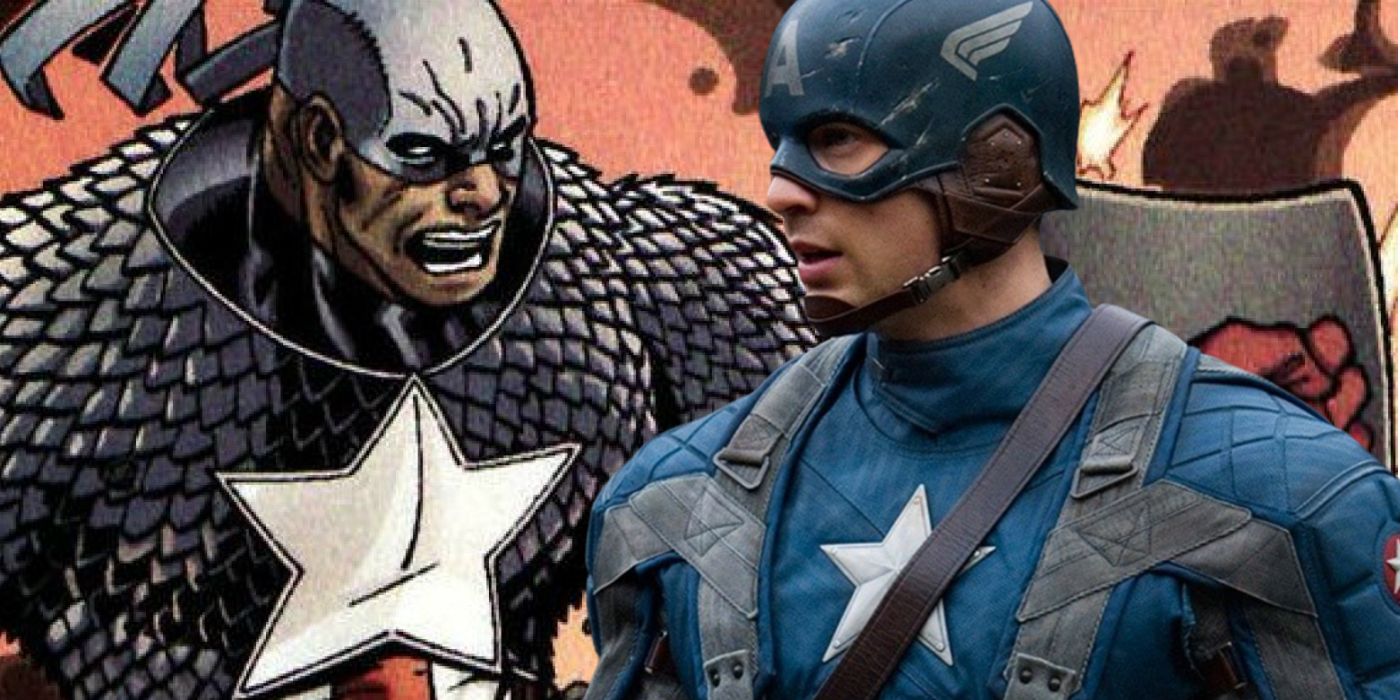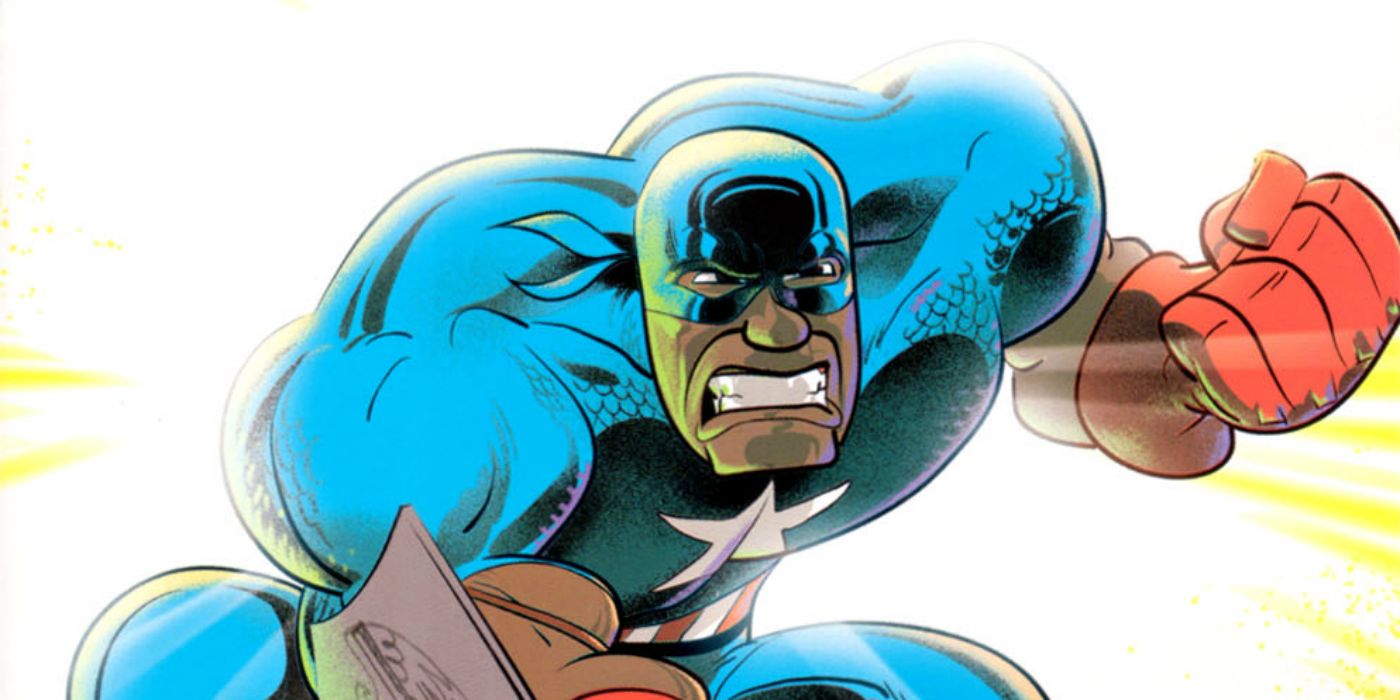Marvel's Falcon & Winter Soldier series will reportedly introduce the first black Captain America, Isaiah Bradley - but how will he fit into the history of the MCU? Avengers: Endgame came to a triumphant close, with an elderly but satisfied Steve Rogers passing on his shield to Sam Wilson. It clearly signified Sam's inheriting the mantle of Captain America, just as he did in the comics.
But it seems Sam's journey to becoming Captain America will be a lot more complex than had previously been thought. The latest reports suggest Falcon will learn the secret history of the US Government's super-soldier program, and as a result he'll initially refuse to wield the shield. Sam Wilson will learn of Isaiah Bradley, a character who - in the comics - was the first black Captain America.
So far, the various Marvel Disney+ shows have seemed remarkably faithful to the original comics. But how could Marvel adapt Isaiah Bradley into the MCU?
The Shocking History Of The Super-Soldier Program
Isaiah Bradley's story hails from a 2003 miniseries called Truth: Red, White, and Black. The idea was proposed by writer Robert Morales, inspired by the infamous Tuskegee Study, in which African Americans were secretly exposed to syphilis. Morales expected Marvel to refuse the idea, given it was so bleak, but he pitched it all the same; to his surprise, Marvel signed off on it. He partnered with artist Kyle Baker, and told a dark tale in which the US Government experimented with the super-soldier serum. Isaiah Bradley was one of 300 black soldiers who were spirited away by Military Intelligence, and subjected to early versions of the serum. Ironically, Bradley had never even wanted to participate in the war at all; he was a conscientious objector, and was offered a choice between 20 years in jail and military service.
Isaiah was one of only a handful to survive the experiments. He and his super-soldier unit were sent to the front lines, but the military never intended to celebrate them as they later would Steve Rogers; after all, they were all black. The military faked their deaths, and then warned them to serve on suicide missions if they wanted their families to live. A furious Isaiah Bradley, inspired by tales of Captain America, decided to claim the mantle for himself; he stole a costume and a prototype shield, and took them out into the field. Unfortunately this proved a tragic mistake; while Isaiah alone survived his mission, he was imprisoned for treason because he'd stolen the outfit and become Captain America. He was sentenced to life imprisonment at Leavenworth, and served 17 years in solitary confinement, finally freed by President Eisenhower in secret. His mind had deteriorated, a combination of the super-soldier serum and the years of confinement, and he never truly recovered.
Truth: Red, White, and Black was a ground-breaking series, and it was initially deeply controversial, introducing the taint of racial prejudice into Captain America's backstory. It was originally seen as something of a politically correct publicity stunt, but every issue was positively received, and the dialogue swiftly changed. As then Editor in Chief Axel Alonso told CBR:
"When we posted our first image of Isaiah Bradley -- the silhouette of an African American man in a Captain America costume -- the media latched onto it as a story of interest, but a lot of internet folks lined up against it, assuming, for whatever reason, that it would disparage the legacy of Steve Rogers. By the time the story was done, the dialog around the series had substantially changed. One high-profile reviewer even wrote a column admitting he'd unfairly pre-judged the series, that he now saw it was about building bridges between people, not burning them -- which I deeply respected. It's especially meaningful when you edit a story that functions as a little more than pure entertainment."
How Isaiah Bradley's Story Can Be Woven Into The MCU
Surprisingly, it's actually not difficult to weave this story into the MCU - and The Incredible Hulk may well be the key. This introduced viewers to General Thaddeus "Thunderbolt" Ross, a high-ranking figure in the US military who was obsessed with the idea of creating new super-soldiers. He was apparently the latest in a long line of military figures to become fascinated by the works of Dr. Abraham Erskine, and to attempt to replicate his success. In fact, Bruce Banner was working for Ross when he came up with an innovative Gamma Serum, and unwisely experimented upon himself, creating the Hulk.
The novelization of The Incredible Hulk fleshes Ross' backstory out still further, hinting there had been other super-soldier programs. In one key scene, Ross debriefed General Greller on the Hulk's origin.
"'Banner's work was a tangent of Bio-Tech,' said Ross after a moment's hesitation.
Greller didn't make the connection at first. Then, when he started to, he couldn't quite believe what Ross was saying. "You told me you were going to Brazil to nab a scientist. Are you telling me another one of your Super Soldier experiments went haywire?" When Ross nodded, Greller leaned back in his chair, amazed. "And you didn't think it was important enough to give me a heads-up?""
It's not hard to imagine a scenario where something very like Truth: Red, White, and Black took place in the MCU. Just as in the comics, the US Government would have attempted to replicate Abraham Erskine's success with Steve Rogers. But Erskine had taken his secrets with him to the grave, meaning their experiments would have most likely gone badly wrong. Still, there could well have been a handful of survivors - one of whom was Isaiah Bradley, the first black Captain America. This revelation would certainly explain why Sam Wilson initially rejects Captain America's shield; he'd be shocked to learn the secret history of Captain America, and the super-soldier experiments that were illegally conducted on black men.
This would be a bold choice, with Marvel Studios copying the comics and introducing racial prejudice into the MCU history of Captain America. No doubt it has the potential to be every bit as controversial as Truth: Red, White, and Black was back in 2003, but hopefully history will repeat itself in another way, and every episode of Falcon and Winter Soldier will be better received than the last.









